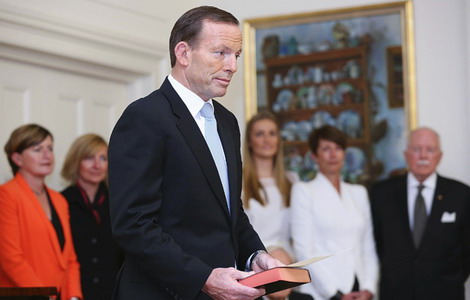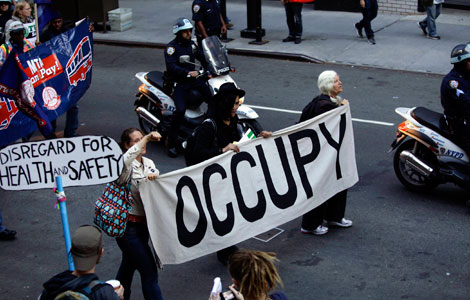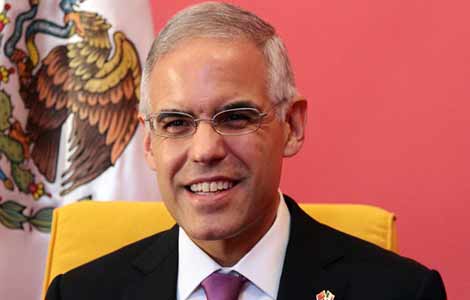China urges resumption of six-party talks
Updated: 2013-09-18 20:22
(Xinhua)
|
||||||||
BEIJING - Chinese Foreign Minister Wang Yi on Wednesday called for "reasonable threshold" to be set for the early resumption of the six-party talks over Korean denuclearization.
Wang made the remarks at an international symposium held in Beijing to commemorate the 10th anniversary of the talks' launch and the eighth anniversary of the signing of the September 19 Joint Statement.
The six-party talks, which group China, Russia, the United States, the Democratic People's Republic of Korea (DPRK), the Republic of Korea(ROK) and Japan, have been stalled since late 2008.
"The six-party talks are the choice of history," said Wang, describing them as an effective means for realizing denuclearization of the Korean Peninsula and maintaining its peace and stability.
The situation in the Korean Peninsula has shown positive changes recently, he said, calling on all parties concerned to seize the current opportunities to push forward the situation.
Wang suggested that all parties should maintain restraint and work together to consolidate the hard-won easing situation in the Peninsula, set reasonable threshold for the resumption of the talks, push forward the objectives of the September 19 Joint Statement in parallel and improve the six-party talks mechanism to enhance its binding force and effectiveness.
During the symposium, DPRK First Vice Foreign Minister Kim Kye Gwan said the DPRK hopes for early restarting of the six-party talks but holds that there should be no preconditions for their resumption.
Kim said the DPRK supports the talks and is open to any form of dialogue within their framework.
The September 19 Joint Statement has pointed out the goals, principles and obligations of each party on denuclearization of the Korean Peninsula, he said, noting that the statement is of great significance.
It was signed on the fourth round of the six-party talks in 2005 and has been the most important result of the talks, as it is a balanced, win-win and constructive document.
It set up the framework for a package solution of DPRK nuclear issues and become a milestone statement since the talks were launched in 2003.
In the joint statement, the DPRK committed to abandoning all nuclear weapons and existing nuclear programs and to returning, at an early date, to the Treaty on the Non-Proliferation of Nuclear Weapons and to International Atomic Energy Agency safeguards.
Under the statement, the United States affirmed that it has no intention to attack or invade the DPRK with nuclear or conventional weapons, and the ROK reaffirmed its commitment not to receive or deploy nuclear weapons. China, Japan, the ROK, Russia and the United States stated their willingness to provide energy assistance to the DPRK.
The six parties also committed to joint efforts for lasting peace and stability in Northeast Asia, it said.
Kim expressed regret that the statement failed to achieve results because some parties had not implemented their obligations and commitments.
According to the first vice foreign minister, realizing denuclearization of the Korean Peninsula needs all six parties to abide by the spirit of the September 19 Joint Statement and fulfill their obligations in a balanced way.
The DPRK hopes for restarting the six-party talks with no preconditions, he said, adding that any such preconditions will fuel distrust.
It is unreasonable to ask the DPRK to dismantle its nuclear program before the resumption of the talks, he said, noting that the requirement violated the spirit of the September 19 Joint Statement.
Kim made these remarks in response to the U.S. administration's stance that Pyongyang should first prove its authenticity toward living up to past disarmament-for-aid agreements such as the September 19 Joint Statement before the six-way talks are resumed.
"I don't think it's yet time really for the heads of the delegation of the six-party process to get together because I do not believe that we yet have the conditions," said Glyn Davies, U.S. special representative for policy on the DPRK, on September 10.
Daniel Russel, assistant secretary of state for East Asian and Pacific affairs, said on September 6 that Pyongyang should keep its past commitments to dismantle its nuclear program to reopen the long-stalled six-party talks.
Kim said the prospect of the September 19 Joint Statement is determined by whether the goals of the joint statement are implemented in a balanced way.
The DPRK will continue to make sincere efforts to realize the denuclearization of the Korean Peninsula and support the resumption of the six-party talks, he said, adding that the country will not beg for the dialogue.
Most Viewed
Editor's Picks

|

|

|

|

|

|
Today's Top News
Gun control debate gathers little steam
China supports US-Russia deal on Syria
Trending news across China on Sept 18
China-US key to global future: report
EU ready for talks with China on investment pact
FDI keeps increasing in August
All's fare as apps take roads to upgrades
Space station to open for foreigners
US Weekly

|

|













